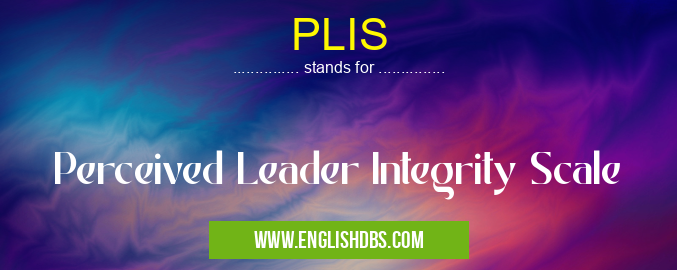What does PLIS mean in UNCLASSIFIED
PLIS stands for Perceived Leader Integrity Scale. It is a psychometric instrument used to measure an individual's perception of the integrity of their leader.

PLIS meaning in Unclassified in Miscellaneous
PLIS mostly used in an acronym Unclassified in Category Miscellaneous that means Perceived Leader Integrity Scale
Shorthand: PLIS,
Full Form: Perceived Leader Integrity Scale
For more information of "Perceived Leader Integrity Scale", see the section below.
What does PLIS measure?
The PLIS is a multi-item scale that assesses an individual's perception of a leader's:
- Honesty: The extent to which the leader is perceived as being truthful and forthright.
- Trustworthiness: The extent to which the leader is perceived as being reliable and dependable.
- Ethicality: The extent to which the leader is perceived as acting in accordance with ethical principles.
- Fairness: The extent to which the leader is perceived as being just and impartial.
- Respectfulness: The extent to which the leader is perceived as treating others with respect and consideration.
Importance of PLIS
Perceived leader integrity is a critical factor in organizational effectiveness. Leaders who are perceived as being honest, trustworthy, ethical, fair, and respectful are more likely to inspire trust, commitment, and motivation among their followers.
Essential Questions and Answers on Perceived Leader Integrity Scale in "MISCELLANEOUS»UNFILED"
What is the Perceived Leader Integrity Scale (PLIS)?
The PLIS is a psychometric scale used to measure employees' perceptions of their leaders' integrity. It assesses the extent to which leaders are perceived as honest, trustworthy, ethical, and principled.
How is the PLIS structured?
The PLIS typically consists of a series of statements or questions that employees are asked to rate on a scale (e.g., Likert scale). These statements address various aspects of leader integrity, such as:
- Keeping promises
- Maintaining confidentiality
- Acting ethically
- Avoiding conflicts of interest
What is the purpose of using the PLIS?
The PLIS is used to:
- Evaluate leaders' perceived integrity
- Identify areas where leaders may need to improve their integrity
- Assess the impact of leader integrity on employee trust, engagement, and performance
- Guide leadership development programs and interventions
Who can benefit from using the PLIS?
The PLIS can benefit various stakeholders, including:
- Leaders seeking feedback on their perceived integrity
- Human resources professionals evaluating leadership effectiveness
- Researchers studying leadership and organizational behavior
- Employees wanting to provide input on their leaders' integrity
Are there limitations to using the PLIS?
Like any psychometric tool, the PLIS has certain limitations:
- It relies on subjective perceptions, which can be influenced by individual biases and perspectives.
- It may not capture all aspects of leader integrity.
- It is not a diagnostic tool and cannot pinpoint the specific reasons for perceived integrity issues.
Final Words: The PLIS is a valuable tool for organizations seeking to assess the integrity of their leaders. By measuring employees' perceptions of their leaders' integrity, organizations can identify areas for improvement and foster a culture of trust and ethical behavior.
